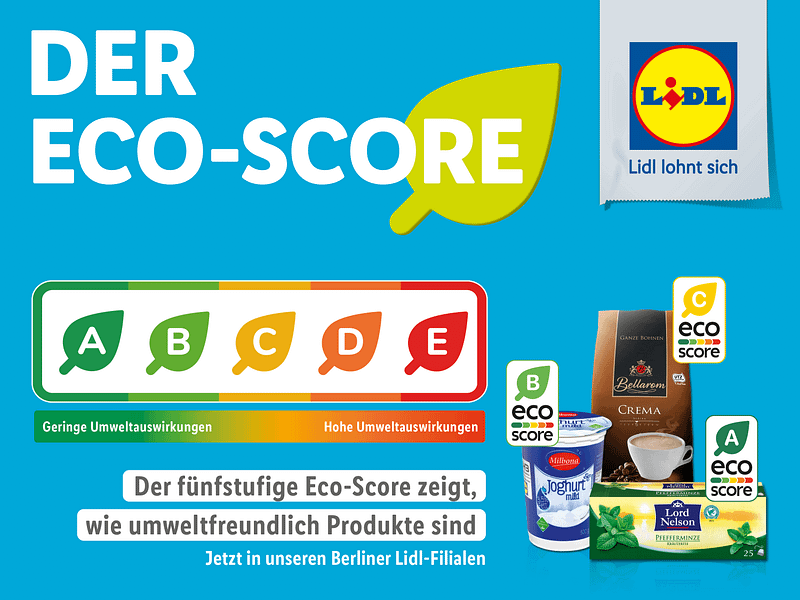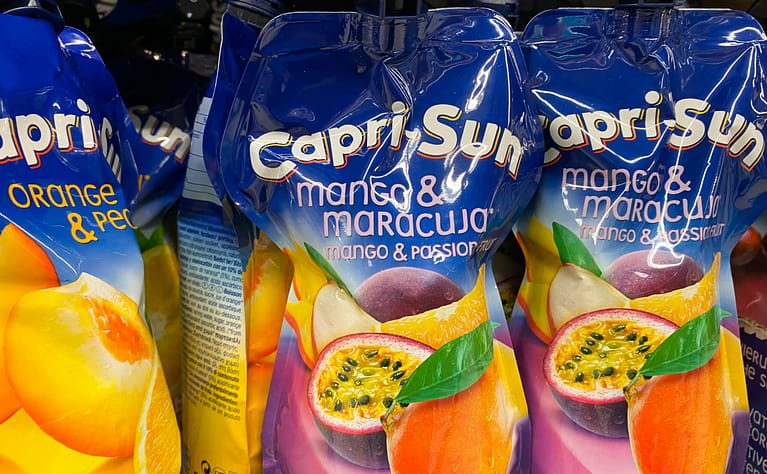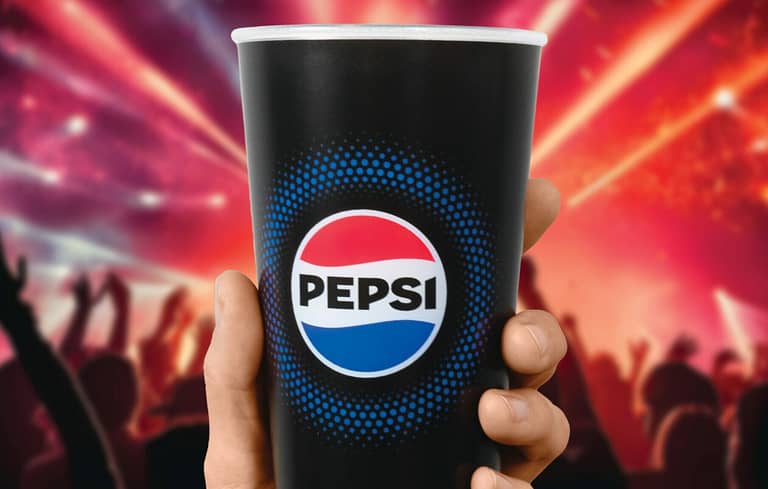Image source: Lidl
Empowering consumers: Lidl tests the Eco-Score for groceries
Thomas Reiner | 16.06.2021
The world’s largest discounter group by number of stores is testing the use of the ECO2 initiative’s five-stage Eco Score. Lidl wants to use the score to communicate the sustainability level of food products to its customers transparently and efficiently, thus empowering consumers with regard to making sustainable purchasing decisions. This is a positive, pragmatic and overdue step for the industry. It will have a steering effect – and will also have an impact on the market for sustainable packaging.
Lidl is the first German retailer to test the use of a five-stage eco-score for food in Berlin. The world’s largest discounter group by number of shops is entering into a partnership with the score’s developer, the ECO2 initiative. The eco-score identifies the environmental impact of the food on a scale from a dark green A to a red E. In addition to the eco-balance of the product, the evaluation also takes into account criteria such as certifications, the origin of the ingredients as well as the type of packaging.
Lidl’s pilot project is a positive and pragmatic step. And in our view, it is long overdue. Because the growing importance of sustainability for the purchasing behaviour of consumers is undeniable and has been firmly established for some time. It is not surprising that consumers’ desire for more sustainability is accompanied by a growing need for information and orientation. A sustainable purchase decision needs a reliable basis for decision-making. This is what the Eco-Score is supposed to provide.
Packaging manufacturers are also directly affected by the development because the sustainability of the packaging flows directly into the Eco-Score. This will additionally drive the already booming demand for ecological packaging solutions and have a strong steering effect.
The Eco-Score method
The Eco-Score is calculated on the basis of the following data:
- Quantitative data of the product life cycle assessment (LCA). The data is determined by experts and implemented in the French database for agriculture and food, Agribalyse. The environmental impacts of production, transport, manufacturing and packaging are taken into account for this LCA.
- The result is a rating on a scale that goes up to 100.
- Data that is not included in the Agribalyse eco-balance, but is included in the score due to its positive or negative impact on the environment. This includes, for example, the material and recyclability of the packaging as well as the origin and seasonality of the food or its ingredients.
- The data taken into account in this step results in a corresponding bonus or malus, which influences the score and leads to the final score value.
The Berlin pilot
Lidl is testing the Eco-Score in all its Berlin stores over the course of the year. For this purpose, the price tags of selected food groups will be equipped with the new labelling. With the pilot project, the discounter wants to explore how consumers perceive the score and how they react to it. Depending on the results, the company will consider implementing sustainability labelling in all its store in Germany.
As simple and effective as the price
Lidl is open to industry-wide labelling alternatives in its initiative. This is also a pragmatic and sensible step. Because ultimately, a sustainability score for food is about one thing: customers need to be informed about the sustainability of the product in a uniform, reliable and simple way. For this, they need an indicator which should be as “simple” and meaningful as the price. It gives us an efficient and intuitive feeling for the cost and value of a product. This is exactly what an eco-score in the area of sustainability is supposed to do – as a responsible basis for the purchase decision.
Steering effect for more than one industry
If a discount giant like Lidl takes up the cause, it will have a steering effect in the industry – and beyond. Because the Eco-Score is also a powerful driver for packaging manufacturers.
It is already a fact that sustainable packaging is the first and most important ambassador of a sustainable product. Now, however, the eco-quality of the packaging also flows directly into the Eco-Score of the food. This will further increase the demand for sustainable packaging solutions. Those who are well positioned here will be able to profit enormously. Those who neglect their homework will be kicked out of the market.




